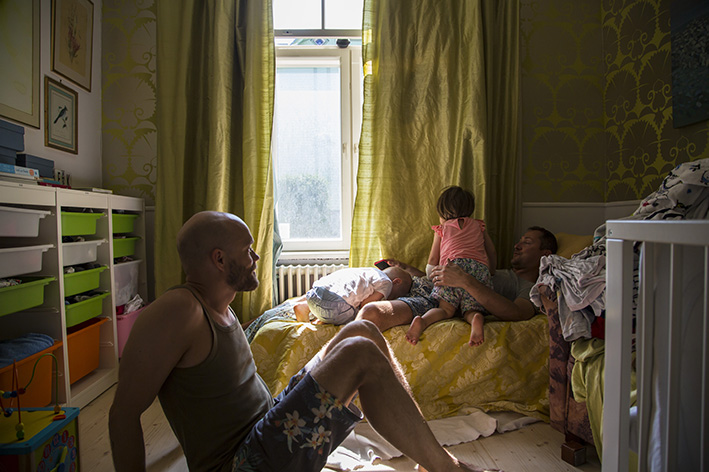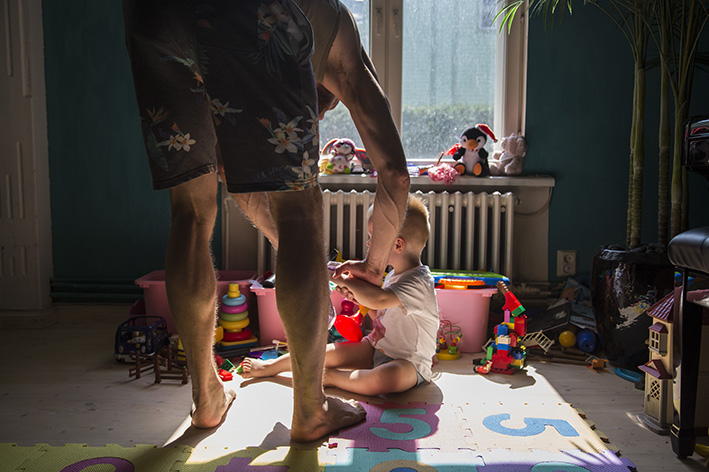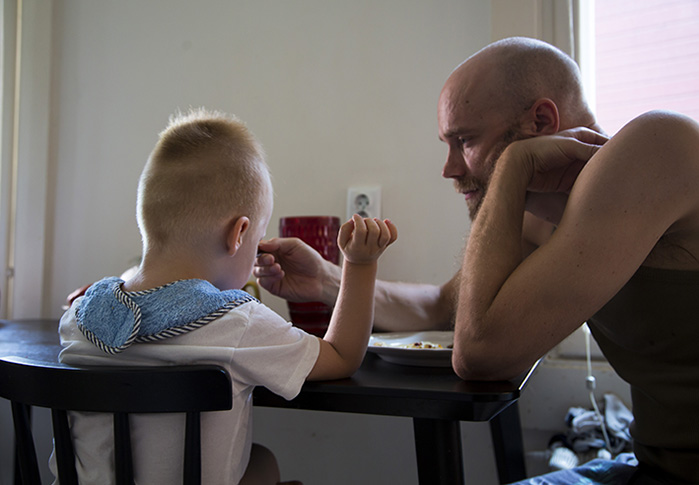Go-Far 2018: Eye on Estonia

Modern Families
Same-sex couples cannot adopt, so more turn to the LGBT community for help to conceive
Story and photos by Ignatius Koh
Triinu Luts lives with her mother and sees her father occasionally during the month. But her parents are not divorced — the 15-year-old ninth-grader has a gay father and a lesbian mother who lead separate lives.
In Estonia, more children like Triinu are being born to homosexual parents.
Here, same-sex marriages are not recognised, so gay couples cannot adopt children — Estonian law states that only a married couple can do so.
As surrogacy is also banned, same-sex couples hoping to start a family approach like-minded members of the opposite sex to discuss the possibility of raising a child together.
“I grew up with my mother so I’m closer to her, but I make an effort to visit my dad a few times a month so we’re also close,” said Triinu, who has a 10-year-old sister born to the same parents.
Mr Vahur Luts, Triinu’s father, and his partner were one of the first couples to agree to such an arrangement in Estonia.
“In a way, I think we are pioneers. Our male gay friends – about 10 couples – have come to me for advice,” said Mr Luts, 56, a sales manager.
Informal Agreement

Toys litter Mr Veenre’s home, where the twins stay on several days of the month.
Despite being the most progressive former Soviet state in terms of LGBT rights, Estonia has few gay clubs that people frequent. Mr Luts was approached at one of these clubs almost 15 years ago by Triinu’s mother, who asked him if he wanted to father a child.
Typically, a non-legally binding verbal or email agreement about the child’s lifestyle will be settled before conception, which can be either natural or via in-vitro fertilisation (IVF).
IVF is a popular conception method in Estonia as it is free for women below 41. Nova Vita Clinic, a private fertility clinic in Tallinn, sees 250 patients a year.
According to Dr Karin Rosenstein, the clinic’s general manager, same-sex couples occasionally come to conceive with someone of the opposite sex.
“Lesbian women can do IVF legally in Estonia so it is not unusual to see them come,” said Dr Rosenstein. “Sometimes a man and woman come in, and they might not be heterosexuals, but we don’t ask.”
Families that do not fit the nuclear family archetype are becoming more common in Estonia.
“We see many types of families around: two lesbian women, single mothers, and gay men and lesbian women,” said Ms Brigitta Davidjants, communication specialist at the Estonian LGBT Association.
The 50-member organisation, which was established in 2008, aims to increase awareness of LGBT issues through advocacy and education.
Ms Davidjants, 35, added: “One of the major hospitals told us that every month, one to three LGBT families are giving birth at their hospital, so that’s quite a lot.”
In most cases, these family arrangements arise as potential parents want a father or mother figure for their children as they grow up.
Mr Luts mentioned that the mother of his children had approached him to be a male role model for them.
“She said that she wanted her kids to have a real father and I understand that very much,” said Mr Luts, who often takes his children on road trips around Europe with his partner.
While Triinu admitted that it can be tiring to see both parents separately, she does not feel that her lifestyle is special in a country where there have been at least half as many divorces as marriages in the past 10 years.
“I’ve always lived like this so I’m used to it, but it’s fun because there are more people to hang out with,” said Triinu.
Court Cases

“Working at home is a luxury few can have, but it allows me to spend time with my kids,” said Mr Veenre.
But not all families enjoy a smooth-sailing relationship.
Mr Tanel Veenre, 41, is currently embroiled in an almost two-year-long legal battle with the mother of his two-year-old twin boy and girl.
This is one of the first cases in Estonia involving same-sex couples fighting for custody of their children. While Mr Veenre and his partner are standing for shared parenting, the mother wants sole custody.
“Our case is a minority in this arrangement. Sadly, the mother of my kids didn't agree on shared parenting and wanted her new partner to replace me as father, so we were forced to start this exhausting court case,” said Mr Veenre, a jewellery designer.
Mr Veenre had written to the Estonian LGBT Association to look for women who had similar hopes of having children, and was eventually paired with his children’s mother after two years.
Despite exchanging over 4,000 emails and text messages on how to best raise the children, disagreements arose after the twins were born.
The twins’ mother and her new lesbian partner had changed their mind about the shared custody that had been agreed to before.
“The first thing I stand for is the kids’ right to have both parents; it’s much more about families than gay families,” explained Mr Veenre, who still harbours hope for a compromise.
Lawyer Reimo Mets, who handles many LGBT cases in Estonia and is a gay activist, believes that it is a struggle for same-sex couples — especially male couples.
“Currently we have seven pending cases, which is a big number for Estonia, and all of them have different problems,” said Mr Mets.
A contentious issue is the Registered Partnership Act, which allows two people to cohabit, regardless of their sex. This bill, passed in 2016, aimed to recognise same-sex unions.
But as the bill is not fully implemented, it is not a marriage law recognised by any notary.
“It means two people can live in the same household, but on what basis nobody cares,” said Mr Mets, who had lobbied for the bill since 2010. “It’s a moral win but in practice, there’s zero value.”
Dr Kai Haldre, a gynaecologist at East Tallinn Central Hospital who has over 30 years of IVF experience, believes that neither the parents’ sexual orientation nor marriage status matters as long as the child is loved.
“The problem is not being gay or lesbian. The welfare of the child is the most important,” said Dr Haldre. “Love and stability is what a child really needs.”
Despite grappling with a legal case that has seemingly no end in sight, Mr Veenre remains steadfast in his desire to put his children before everything else.
“At the end of the day, the kids should have more pluses than minuses,” said Mr Veenre. “I believe that in the end, humanity will win.”